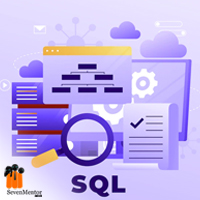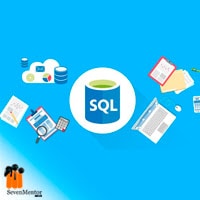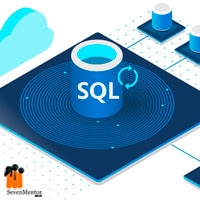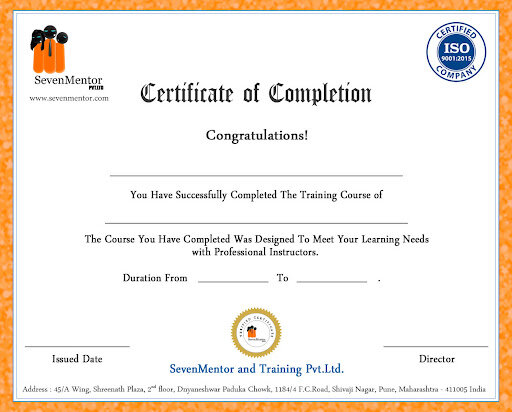SQL
The SQL Course in Rajkot is the standard language for RDBMS and is used to connect to a database (Relational Database Management Systems). The SQL training in Rajkot statement is used to run activities such as retrieving data from a database or updating data on a database.
Call The Trainer
Batch Timing
- Regular: 2 Batches
- Weekends: 2 Batches
Request Call Back
Class Room & Online Training Quotation
About SQL
SQL classes in Rajkot are utilised in a variety of sectors, including technical vocations such as web designer, software developer, software quality assurance, database administrator, and hosting technician. Individuals can progress from beginner to expert level by taking advantage of the numerous offered courses. Through these SQL training classes in Rajkot, you will become acquainted with the primary functions of SQL, such as conversions, SQL syntax, and dates, and you will learn to confidently traverse and command databases. SQL creates and fetches the required data. It enhances the beauty of table arrangements in order.
How to Learn SQL course in Rajkot From the Ground Up
Understanding SQL can provide you with a competitive advantage as a computer professional. Even if you have no prior expertise with online or software development, you can start studying SQL training in Rajkot on your own and working toward proficiency. If you intend to work with databases in any capacity or want to broaden your professional horizons, knowing SQL course in Rajkot can be quite beneficial, if not necessary.
What you should know before you start SQL
Before you begin learning SQL, there are a few things you need to understand about the language, its capabilities, and restrictions.
Specific SQL uses may differ among professions and industries, but the query language is used to administer databases in general. SQL is extensively used by data scientists and analysts to upload, query, and organise data into tables. SQL can be used by data engineers to assign permissions to data across corporate members. Most websites store user data in databases, and many developers use SQL to interact with the data they collect.
Once you've mastered SQL, don't stop learning
SQL course in Rajkot is one of the most widely used computer languages today. However, as previously said, it is not the only one that is used to administer databases. Because of the increasing demand for scalable, non-relational databases, prospective coders and data professionals may want to supplement their SQL experience by studying one or more NoSQL query languages.
Begin with the fundamentals
The same is true for SQL. By concentrating on the fundamentals, you can more easily adjust your education and prepare for more sophisticated database work in the future.
SQL novices should generally concentrate on learning how to utilise database servers — tools that aid database management — as well as the typical commands used while traversing databases. SQL syntax, queries, modifiers, and calculations are also fundamental topics.
The rules that define symbol combinations inside a language are referred to as syntax. SQL training in Rajkot syntax differs slightly between single-table and multiple-table databases. You must comprehend the syntax for clauses and operations such as those described below. Remember that syntax may differ depending on the database, the number of tables, and whether or not the tables are partitioned!
What should I study to Complement SQL classes in Rajkot?
Learning SQL will only be a portion of your development and education because occupations that require SQL competence will also require other coding skills. We've included a few fundamental abilities that should serve as the foundation for your programming toolset below.
Why should you study SQL?
If you want to work in a field that even remotely involves data manipulation or analysis (e.g., back end programming, data science, cybersecurity, etc.), you should learn SQL. SQL, as previously stated, is the standard query language used to interface with relational databases. If you lack this fundamental talent, you will struggle to meet your daily obligations – or even find a company willing to hire you.
What is the Purpose of SQL course in Rajkot?
SQL has been an American National Standards Institute (ANSI) and International Organization for Standardization (ISO) standard for relational database construction, maintenance, and manipulation since the 1980s. SQL allows developers to conduct a wide range of activities. Among these encompass, but are not restricted to:
Making a database
Adding additional information to an existing database
Changing data
Data retrieval and deletion
Adding or removing new tables
Configuring access rights
Making a view, a function, and a stored procedure
It is important to note that SQL is merely the standard for working with relational databases. Relational databases organise data into tables that are linked based on their common ("related") data. This structure helps users comprehend how data pieces are related and provide them with more information.
A Scale-Out Architecture can handle large amounts of data at high speeds.
SQL databases are typically constructed utilising a scale-up architecture, which is based on increasing the size of computers with more CPUs and memory to boost speed.
NoSQL databases were developed during the Internet and cloud computing eras when it was easier to design a scale-out architecture. Scalability is accomplished in a scale-out architecture by allocating data storage and processing undertakings over a vast cluster of computers. More computers are added to the cluster to boost capacity.
This scale-out architecture is especially simple to deploy in cloud computing environments, where new computers and storage may be added to a cluster with ease.
Store data that is unstructured, semi-structured, or structured.
Relational databases contain information in structured tables with predetermined schemas. To use relational databases, first, create a data model, then transform and load the data into the database.
When data is used in applications, it must be obtained using SQL and modified to the application's format. The data must then be turned back into relational tables when it is written back.
NoSQL databases have grown in popularity because they allow data to be stored in ways that are easier to understand or more similar to how applications use data. When data is saved or retrieved for use, fewer transformations are necessary.
Use the Cloud to its full potential to ensure zero downtime.
Most NoSQL databases feature a scale-out architecture, which not only gives a clear method to scale to support large data sets and high amounts of traffic. Delivering a database utilising a cluster of machines also allows the database to automatically increase and contract capacity.
Furthermore, many NoSQL databases can be upgraded and the database schema changed with no downtime.
Developers in general, and JavaScript developers in particular, gravitate toward MongoDB, reinforcing its position as the most desired database by developers, according to StackOverflow.
Learn more about MongoDB's unique benefits or get started right now with MongoDB Atlas, the fully-managed version of MongoDB that operates on all platforms.
Online Classes
It's always exciting to learn new stuff. To earn more money in life, pupils should broaden their knowledge with the help of a mentor. Knowledge of technology can help technical graduates choose at random which aspects to learn at Online SQL Training in Rajkot. We are experts in the vast majority of popular and relevant sectors. At Online SQL Classes in Rajkot. we have a variety of tests and exams for the courses you take. This considerably boosts the talents of students. At the placement cell, new graduates can find comfortable and stylish positions.
Course Eligibility
- Freshers
- BE/ Bsc Candidate
- Any Engineers
- Any Graduate
- Any Post-Graduate
- Working Professionals
Syllabus of SQL
- Module 1:
- Introduction to MySQL. Installation of MySQL server. Download sample database .Load sample database to work.
- Module 2:
- Writing Basic SQL
- Topic:
- Basic SELECT Statement
- Selecting All Columns
- Selecting Specic Columns
- Writing SQL Statements
- Column Heading Defaults Arithmetic Expressions
- Using Arithmetic Operators
- Operator Precedence
- Using Parentheses
- Dening a Null
- Dening a Column Alias
- Using Column Aliases
- Concatenation Operator
- Using the Concatenation Operator
- Literal Character Strings
- Using Literal Character Strings
- Duplicate Rows
- Eliminating Duplicate Rows
- Module 3::
- Restricting and Sorting Data:
- Topic ::
- Limiting Rows Using a Selection
- Limiting the Rows Selected
- Using the WHERE Clause
- Character Strings and Dates
- Comparison Conditions
- Using Comparison Conditions
- Other Comparison Conditions
- Using the BETWEEN Condition
- Using the IN Condition
- Using the LIKE Condition
- Using the NULL Conditions
- Logical Conditions
- Using the AND Operator
- Using the OR Operator
- Using the NOT Operator
- Rules of Precedence
- ORDER BY Clause
- Sorting in Descending Order
- Sorting by Column Alias
- Sorting by Multiple Columns
- Module 4:
- Working on DDL Commands
- Topic:
- Relational Database Management System (RDBMS)
- Normalization
- Create Database objects
- Data Types in SQL
- Alter Table Statements
- Drop Table Statements
- Various Constraints
- Creating Views
- Module 5:
- Working on DML statements
- Topic:
- Data Manipulation Language
- Adding a New Row to a Table
- The INSERT Statement Syntax 8-5
- Inserting New Rows
- Inserting Rows with Null Values
- Inserting Special Values
- Inserting Specic Date Values
- Creating a Script
- Copying Rows from Another Table
- Changing Data in a Table
- The UPDATE Statement Syntax
- Updating Rows in a Table
- Updating Two Columns with a Subquery
- Updating Rows Based on Another Table
- Updating Rows: Integrity Constraint Error
- Removing a Row from a Table
- The DELETE Statement
- Deleting Rows from a Table
- Deleting Rows Based on Another Table
- Deleting Rows: Integrity Constraint Error
- Using a Subquery in an INSERT Statement
- Module 6:
- Working on multiple tables and Retrieve records from multiple tables
- Topic :
- Self-Join
- Inner Join
- Left Join
- Right Join
- Cross Join
- Module 7:
- Working on subqueries
- Topic :
- Using a Subquery to Solve a Problem
- Subquery Syntax
- Using a Subquery
- Guidelines for Using Subqueries
- Types of Subqueries
- Single-Row Subqueries
- Executing Single-Row Subqueries
- Using Group Functions in a Subquery
- The HAVING Clause with Subqueries
- Multiple-Row Subqueries
- Using the ANY Operator in Multiple-Row Subqueries
- Using the ALL Operator in Multiple-Row Subqueries
- Null Values in a Subquery
- Module 8:
- Use of built-in function in SQL
- Topics:
- Conversion Function
- Logical Functions
- Math Function
- Aggregate Functions
- String Functions
- Date Functions
Trainer Profile of SQL
Our Trainers explains concepts in very basic and easy to understand language, so the students can learn in a very effective way. We provide students, complete freedom to explore the subject. We teach you concepts based on real-time examples. Our trainers help the candidates in completing their projects and even prepare them for interview questions and answers. Candidates can learn in our one to one coaching sessions and are free to ask any questions at any time.
- Certified Professionals with more than 8+ Years of Experience
- Trained more than 2000+ students in a year
- Strong Theoretical & Practical Knowledge in their domains
- Expert level Subject Knowledge and fully up-to-date on real-world industry applications
SQL Exams & Certification
SevenMentor Certification is Accredited by all major Global Companies around the world. We provide after completion of the theoretical and practical sessions to fresher’s as well as corporate trainees.
Our certification at SevenMentor is accredited worldwide. It increases the value of your resume and you can attain leading job posts with the help of this certification in leading MNC’s of the world. The certification is only provided after successful completion of our training and practical based projects.
Proficiency After Training
- The Candidate have a good understanding of database concepts and database management system with relational database tools. He will work effectively on relational databases.
- A high-level understanding of RDBMS components and their internal functions which is required in project development.
- Candidate can understand applications data requirements and model into the software by using the ER diagrams and design database structural schemas based on that model.
- One can easily work on SQL commands such as create table, alter table modify table ,delete a records from table Select the data based on various conditions by applying group by ,having and other advanced queries such as sub queries ,joins ,set operators etc.
- In TCL that is transaction control management candidate can understand and work on various TCL commands.
- Candidate can be able to program a data intensive query application using RDBMS functionality
Key Features
Skill level
From Beginner to Expert
We are providing Training to the needs from Beginners level to Experts level.
Course Duration
12 weeks
Course will be 90 hrs to 110 hrs duration with real-time projects and covers both teaching and practical sessions.
Total Learners
2000+ Learners
We have already finished 100+ Batches with 100% course completion record.
Frequently Asked Questions
Batch Schedule
Students Reviews
Beneficial training. A well-known institute is SevenMentor & Training Pvt. Ltd. Here you can learn about a variety of technologies.
- Raghu Kelkar
The instructors were extremely knowledgeable about their subjects, in my opinion. I'm looking forward to learning more from this website. The learning setting was both calm and active.
- Shivani Tomar
The staff was quite helpful. Learning and extending my knowledge is vital to me. It was discovered here. Everything was wonderful.
- Dinesh Tondle
Course video & Images



Corporate Training
Both experienced and new workers demand skills. Top organisations occasionally seek more in-depth knowledge in specialised industries. Professional coaching is also available from SevenMentor & Training Pvt. Ltd. Finally, Corporate SQL training in Rajkot is required for all businesses. Knowledge testing and application help you and your future activities in any organisation. The instructors and staff at SevenMentor & Training Pvt. Ltd. are invariably accessible to assist you and retort your questions. We employ a win-win strategy.
Our Placement Process

Eligibility Criteria

Placements Training

Interview Q & A

Resume Preparation

Aptitude Test

Mock Interviews

Scheduling Interviews

Job Placement

Related Courses
Have a look at all our related courses to learn from any location
At SevenMentor, we are always striving to achieve value for our candidates. We provide the Best Big Data Hadoop Training which includes all recent technologies and tools. Any candidate from...
Django is a simple , free and open-source web development framework, written in Python. A web framework contains a set of components that helps us to develop websites faster and...
Request For Call Back
Class Room & Online Training Quotation

